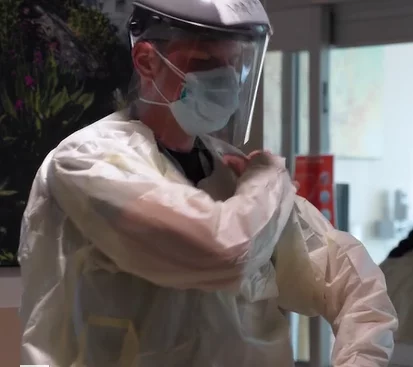
UCHealth and students at the University of Colorado School of Medicine Colorado Springs Branch have launched a research project that seeks to learn how COVID-19 patients are faring after leaving the hospital and identify how the health system can improve care for future patients. To date, more than 125 patients who were hospitalized at UCHealth in the Pikes Peak region have taken part in the continuing project.

The idea for the project arose as a way to connect medical students with patients during the pandemic in a way that is both safe and meaningful.
“These are our future doctors and medical leaders of tomorrow. And the more experience we can give them in the pandemic today, the better equipped they will be to handle future pandemics,” said Dr. Renna Becerra, inpatient internal medicine liaison for the CU School of Medicine Colorado Springs Branch and co-investigator of the project. Becerra added it’s also important for physicians and others involved in COVID-19 care to hear how their former patients are doing.
“Patients probably don’t realize this, but after discharge, we carry their stories with us and we worry about them. We wonder how they’re doing and what we could have done better.”
Dr. Robert Lam, emergency medicine physician at UCHealth Memorial and clinical assistant professor at the CU School of Medicine, added it’s also important to learn whether patients are getting the resources they need once they leave the hospital. “But the other goals that we have are to understand what it means to be a patient with COVID-19 — how that affects them personally with their health, how it affects them financially, how that affects their emotional well-being, which I think is equally important.
“We’re learning that a lot of patients were struggling with anxiety and depression, and loneliness, after being discharged from the hospital. And they still have, unfortunately, both the emotional impact of a great fear of returning to their families and the community. That was something that we probably would not have known if we didn’t have the project ongoing.”
Improving care for COVID patients
Becerra said some of the findings have been unexpected. “One of the things that has surprised me about this study, given the amount of suffering and isolation these patients go through, is how grateful they are for our care and how much gratitude they have for our institution, for what we’ve done for them. And we’re continuing to look at UCHealth Memorial for more ways to be able to treat COVID patients more effectively and to improve their experience in the hospital setting. So when we get feedback on how patients are grateful, we make sure to get that back to the nurses and the doctors who were taking care of those patients, because this pandemic has been hard on everybody, including hospital staff.”

Lam and Becerra said such a project – which involves sometimes lengthy phone interviews and conversations with patients – would not be possible without the students. “It reinforces the fact that students can make a difference in actual patient care. They can continue to advocate for patients even though they aren’t part of the direct caregiving team,” Lam said. “And I think that helps us to continue to create doctors that are even stronger patient advocates, which is definitely something I see among our students at the Colorado Springs Branch.”
Students are already working on sub-projects to improve care based on their interviews, including providing patients with mental health resources, education and handouts about the importance of blood thinners to prevent blood clots — which are a risk for patients with COVID-19 — and forming a support group for patients so they can connect with one another to share stories and combat the isolation and loneliness that many are experiencing.
Danielle Davis, who is among the roughly 20 or so third-year medical students who have so far been involved in the project, said patients have been very willing to share their stories.
“I found that most people want to talk about their experiences that they’ve had with COVID-19 and most people found their experiences with COVID-19 to be a life-altering event,” she said. “I hear a lot about isolation when I call patients who have been hospitalized with COVID-19. A lot of people report feeling lonely when they’re in the hospital and also lonely when they get home, feeling like other people don’t want to be around them after they’ve had a diagnosis of COVID-19.
“I’ve also heard a lot about having a new outlook on life. A lot of people talk about having a new emphasis on family and spending time with their family and caring for their loved ones. And several people have also talked to me about a spiritual journey that they had while they were in the hospital because of how close they came to dying from COVID-19.”
Davis said she’s enjoyed connecting with patients, hearing their story and having a part in improving care.
“This project is important because we’re really at a pivotal moment of listening to our patients who have had COVID-19, listening to the experiences that they’ve had, and trying to understand what we as health care providers are doing well and what we can improve on. So data and the information from projects like this are really going to shape how we treat and approach COVID-19 in the future.
“Projects like this help medical students become better doctors because I think it reminds us of what patients really go through when they have these life-changing experiences with disease. It reminds us of empathy and the human connection that’s necessary in order to fully support patients so that they can achieve their optimal health outcomes.”
